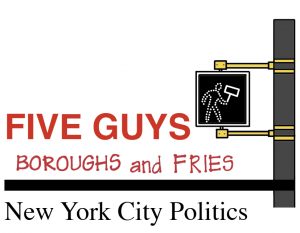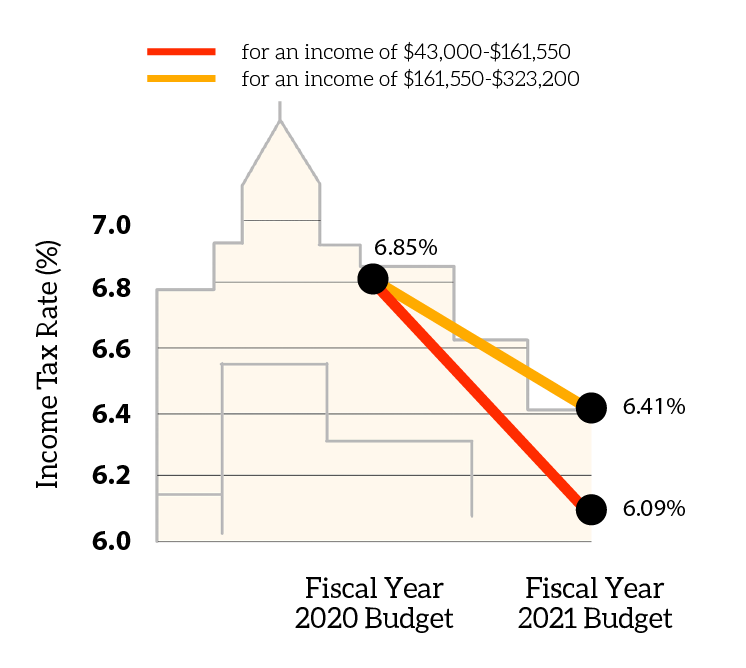New York’s Budget: It Ain’t Much, But It’s an Improvement
Opinions Column: Five Guys Boroughs and Fries
April 28, 2020
 Such is the case with New York state’s recently approved budget for the 2021 fiscal year. Although strategically sprinkled with all too common sleights of hand from New York politicians, next year’s budget poses a win for New York’s middle class residents and reinforces safety throughout the city and state.
Such is the case with New York state’s recently approved budget for the 2021 fiscal year. Although strategically sprinkled with all too common sleights of hand from New York politicians, next year’s budget poses a win for New York’s middle class residents and reinforces safety throughout the city and state.
First and foremost, the budget, narrowly approved by the state legislature and signed by Gov. Andrew Cuomo on April 3, lowers the state income tax rates for nearly all middle-class New Yorkers. Any New Yorker making between $27,900 and $323,200 in annual taxable income will see their state tax rate drop. And while $323,000 might seem like a rich man’s salary, keep in mind that New York is the nation’s most expensive city in nearly every metric. One financial adviser at Business Insider stipulated that it takes a $300,000 salary to even be considered middle-class in cities like New York. It should also be noted that New York City is one of the nation’s rare localities to level a local income tax, and a high rate at that.
But wait, there’s more. With a new limit on how much of state and local taxes Americans can deduct from their federal tax returns, residents in high-tax states like New York and New Jersey were hit with whopping tax bills last year. It doesn’t get much more expensive than the Big Apple. For a city whose annual budget is already higher than Florida’s, a state with twice the population, the last thing New York needs to discuss is a tax hike.
In another important feature, the budget significantly alters the state’s bail procedure. Previously, New York had usurped its entire way of handling pre-trial detention by eliminating cash bail for most crimes and releasing inmates while they awaited their trial. Pressed by concerns over the safety of this reform from across the ideological spectrum, from Mayor Bill de Blasio to the NYPD Commissioner, the state legislature tweaked this rule, renewing 15 categories of crimes that are now eligible for cash bail. The budget also gives judges discretion on placing restrictions on defendants while they await their trial.
This common-sense reform of the reform makes New York safer for everyone. In January, when the previous relaxations on cash bail began, crime rates in New York City spiked. According to NYPD officials, as of Jan. 1, 483 people who had previously been arrested for a felony were rearrested for committing 846 additional crimes. This is a common-sense provision that should have served as the crux of the initial bail reform, but it’s better late than never. Let those being charged with misdemeanors and many non-violent offenses stay out of prison until their trial and keep the serious offenders behind bars.
The budget also hands a win to environmental activists, banning Styrofoam found in single-use food containers and the similarly composed packing peanuts. It creates a $3 billion bond to fund environmental restoration throughout the state. Instead of furthering the continued harassment of car owners who drive in Manhattan, it includes legislation to legalize the e-bike and e-scooter network.
So, what’s wrong with the budget?
Concerns over the environment go too far, for one. Cuomo touted the budget’s permanent ban on hydraulic fracturing, commonly known as fracking, in the state. To be fair, there are certainly tenable concerns over fracking and its safety and environmental effects, but an outright ban on the practice is not a good idea. Over the past two decades, this process has lowered our nation’s carbon emissions and decreased our reliance on foreign oil from Russia and Saudi Arabia. Many younger Americans might not remember when President George W. Bush said, “America is addicted to oil.” Now we aren’t, but that’s because of fracking. Ask yourself the following question. What would be worse for the environment: fracking in a highly regulated U.S. state, or oil production in developing nations run by quasi-dictators?
This fracking ban is a product of emotional outage from the lobbying of environmental activists. Until we can feasibly implement cheaper and more environmentally efficient forms of energy extraction, fracking should continue. The ban will simply write a multi-million-dollar check to northern Pennsylvania communities situated on top of Marcellus shale, a type of rock containing the largest source of natural gas in the U.S. With an impending recession due to the coronavirus crisis, I’m sure Pennsylvanians in the natural gas industry will be very thankful to New York.
Additionally, I’ve noted that honesty and New York politicians don’t mix well. We see that front and center with this budget. The state legislature is getting set to implement congestion pricing on cars driving below 60th Street in Manhattan as a way to reduce the already snail-like pace of traffic in the city. State officials had promised that the money would go into a lockbox solely for use on Metropolitan Transportation Authority (MTA) capital projects. Now, the state has amended this language, allowing the MTA to use this money for any operating expenses. According to the New York Post, this will make it easier for the state to grab cash from the agency. So much for promises.
But don’t hold your breath for politicians to become honest; that’s like waiting until the cows come home. Although imperfect, it is refreshing to see a bipartisan, fair and comprehensive budget for the Empire State.












